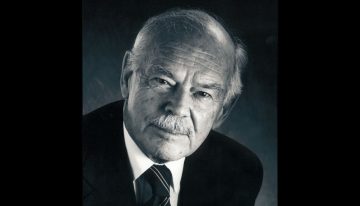Three UBC students pursuing commercial technologies — data sensors for wine production, a chip-based wireless power transfer system and software for the analysis of customer feedback — are the inaugural recipients of a fellowship established by an inventor of modern steel-making.
The Dr. Frank and Dr. Gordon Forward Commercialization Fellowship is awarded annually to graduate students in the Faculty of Applied Science, Sauder School of Business or Faculty of Science who are passionate about commercialization. The fellowship, made possible by an endowment created by Gerald Heffernan, will not only train recipients in developing and advancing their respective technology but also help them attract seed financing.
Heffernan, an innovator himself, revolutionized the world’s steel industry by refining the electric-arc furnace steel-making process, precluding the need for a blast furnace and making “mini-mills” possible. An astute businessman as well as a brilliant innovator, Heffernan established a mini-mill empire throughout North America. The process of electric-arc furnace steel-making now comprises 30 per cent of the world’s steel production.
Jerry Heffernan chose to name the fellowships in honour of Dr. Frank Forward (Hon DSc 1965, UBC) and Dr. Gordon Forward (BASc 1960, MASc 1962, Hon DSc 1996, UBC). Heffernan joined UBC after serving in the Royal Canadian Engineers in World War II. He worked under Professor Frank Forward, who was then one of the world’s most prominent metallurgists, and head of UBC’s Department of Metallurgy from 1935 to 64. Forward himself was an inventor, having developed a new method for recovering nickel from low-grade ore. Gordon Forward, also prominent in the steel industry, was a longtime business partner of Jerry Heffernan in advancing the mini-mill steel industry.
Announcing the Inaugural Commercialization Fellows
Miayan Yeremi is a PhD candidate in mechanical engineering and Director of Research and Development at BarrelWise Technologies. He has an undergraduate degree in physics, and master’s degrees in astrophysics and statistics as well as mechanical engineering. The company, a venture in UBC’s HATCH startup accelerator, is developing the world’s first comprehensive solution for wine barrel management, delivering process efficiency, quality control and barrel-by-barrel quality insights. Yeremi’s current focus is on designing, building and commercializing a novel free sulphur dioxide sensor that will provide an early alert to winemakers when individual barrels are at risk of spoilage or over-oxygenation. He is grateful for the support offered by the fellowship, as it will help the company move faster toward commercialization of their sensor technology and ultimately to their goal of delivering data-driven insights to the wine industry. In September 2020, Yeremi won the Mitacs Outstanding Entrepreneur Award for his work on this disruptive technology.
As a high school student in Iran, Mohammad Javad Shariatzadeh won the gold medal at the Seventh Annual National Olympiad of Astronomy and Astrophysics in 2011, then went on to win a silver medal at the Sixth Annual International Olympiad of Astronomy and Astrophysics the following year in Rio De Janerio. The international competition is part of the International Science Olympiads, a group of worldwide annual exam-based competitions for high school students in various areas of science, selected through internal National Science Olympiads. Shariatzadeh studied mechanical engineering as an undergraduate, building a bladeless wind turbine for his thesis. He shifted to biomedical engineering when he came to UBC for his master’s studies, and is now pursuing a PhD in mechanical engineering while nurturing the HATCH startup company Daana Resolution Inc., which he and a friend co-founded. With an initial focus on wireless charging of electric light vehicles, the company is now concentrating on producing a chip-based wireless power transfer system for use in solar panel arrays. Daana’s chip is designed to enable solar panel arrays to generate power at lower thresholds for longer daylight hours. Shariatzadeh and Daana’s ultimate goal is to have their chip integrated into panels as they are manufactured. If successful, their system could dramatically help reduce our reliance on fossil fuels. The Forward Commercialization Fellowship will help Shariatzadeh and his partners realize this ambitious goal.
Patrick Boutet is pursuing a master’s degree in computer science with a focus on natural language processing (NLP). Early in his graduate work, Boutet negotiated and managed a collaboration between UBC’s Departments of Medicine and Computer Science to apply the technologies developed by the UBC NLP group to the analysis of patient-health provider communications. Boutet demonstrated a similar resourcefulness when he initiated and negotiated a collaborative research agreement between the NLP group and a large local retailer, giving him access to a massive dataset of agent-customer support conversation transcripts. This resource provides a crucial testbed for Boutet’s research, and that of the NLP group generally. It will also provide a real-world foundation for his venture to commercialize the text-analytics work he is doing in his thesis. The company is developing chat analytics software to provide business insights from customer-contact centre conversations in industries such as banking, telecommunications, airlines and retail. With 60,000 contact centres in North America alone, the potential applications for Boutet’s work is enormous. Since the company is in its early stages, Boutet is extremely grateful for the Forward Commercialization Fellowship, as it will help carry him through to the point where he and his colleagues can secure investor funding. Furthermore, Boutet sees his startup as a model symbiotic research-commercialization partnership that he generously wishes to promote, and is the way of the future for much academic research. He plans to apply to join HATCH in December to accelerate the progress of his company.
